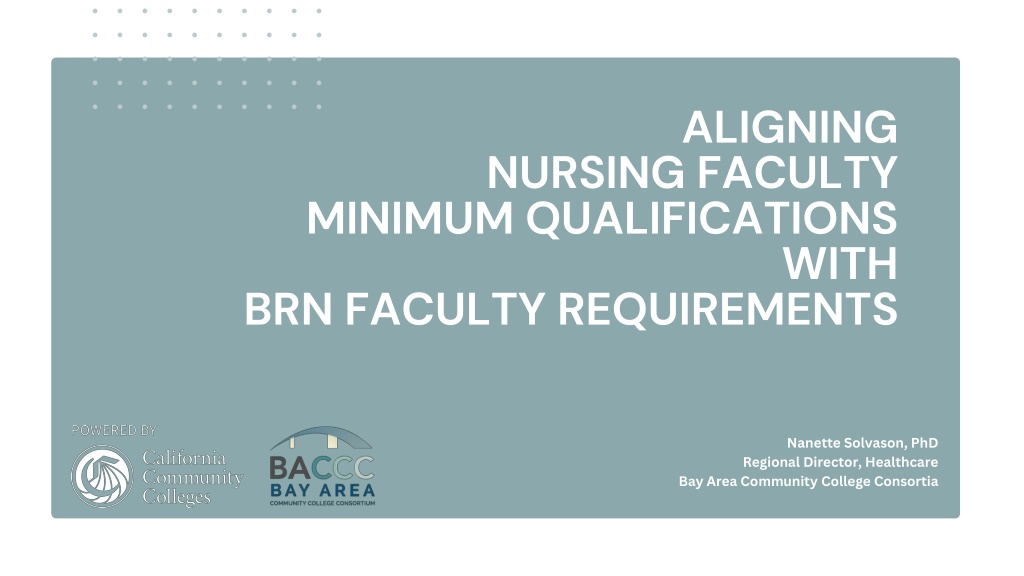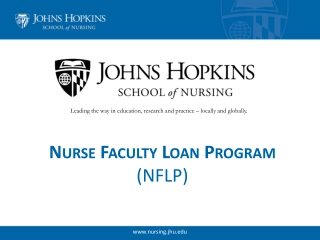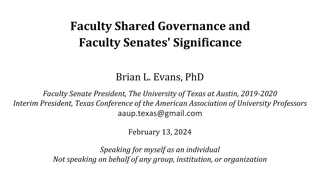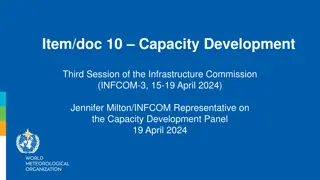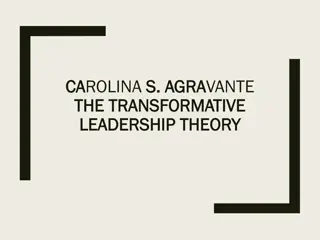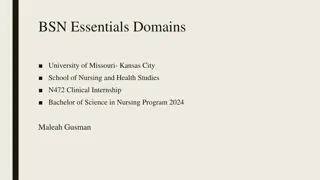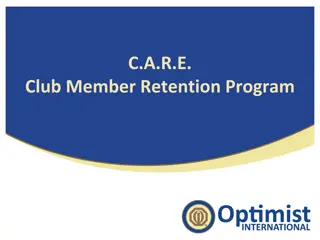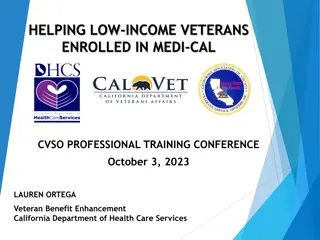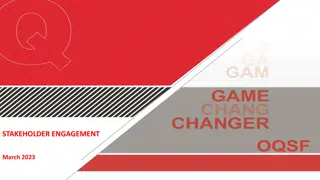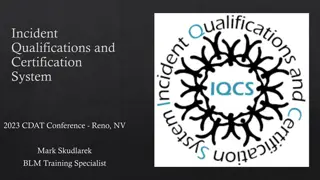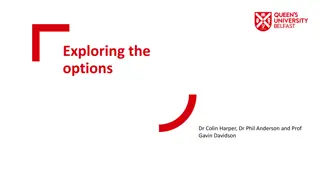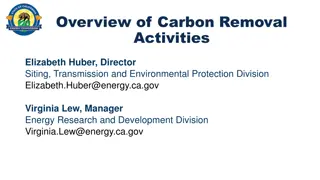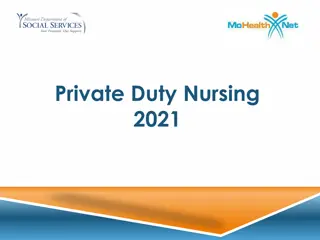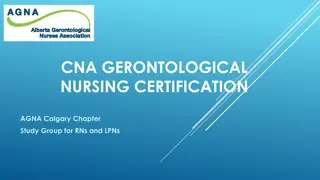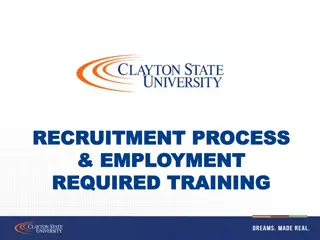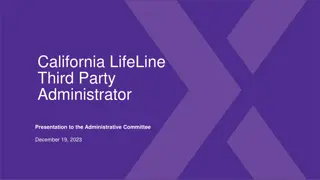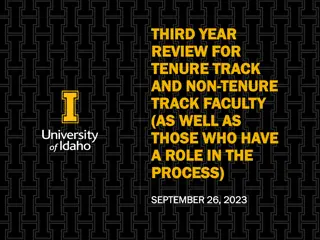Addressing Nursing Faculty Qualifications to Improve Program Capacity in California
Examining the alignment of nursing faculty qualifications with state requirements in California, highlighting declining admission capacities and faculty vacancies across regions. The need for aligning standards to enhance faculty recruitment and overcome barriers to program growth is emphasized.
Download Presentation
Please find below an Image/Link to download the presentation.
The content on the website is provided AS IS for your information and personal use only. It may not be sold, licensed, or shared on other websites without obtaining consent from the author. Download presentation by click this link. If you encounter any issues during the download, it is possible that the publisher has removed the file from their server.
Presentation Transcript
ALIGNING NURSING FACULTY MINIMUM QUALIFICATIONS WITH BRN FACULTY REQUIREMENTS Nanette Solvason, PhD Regional Director, Healthcare Bay Area Community College Consortia
PROGRAMS REPORTED DECLINED IN ADMISSION CAPACITY 18 PRE-LICENSURE PROGRAMS IN THE SF BAY AREA
PROGRAMS REPORTED DECLINED IN ADMISSION CAPACITY CAPACITY IN 11 PROGRAMS DECLINE IN ADMISSION 22-23 No change in admission capacity 22-23 Decline in admission capacity
EVERY PROGRAM WITH DECLINING ADMISSTION CAPACITY REPORTED VACANT FACULTY POSITIONS RANGING FROM 2-8
HEAVY COMPETITION FOR FACULTY WITH BSN PROGRAMS Decline in admission capacity Public and Private Pre-licensure Baccalaureate in RED
ALIGNING THE CCCCO MIN QUALS WITH BRN FACULTY REGULATIONS WILL REMOVE A BARRIER IN FACULTY RECRUITMENT
FACULTY VACANCIES ARE REPORTED IN EVERY REGION OF THE STATE
EVERY BRN REGION LISTED LACK OF FACULTY AS A BARRIER TO GROWTH VACANCY RATES IN PUBLIC NURSING PROGRAMS ACROSS THE STATE DISAGGREGATED BY REGION FOR THE 2021-2022 ACADEMIC YEAR BAY AREA - 11% CENTRAL COAST - 23% GREATER SACRAMENTO - 13% INLAND EMPIRE - 11% LA AREA - 11% NORTHERN CALIFORNIA - 5% NORTHERN SACRAMENTO VALLEY - 12% SAN JOAQUIN VALLEY - 14% SOUTHERN BORDER - 11% DATA TAKEN FROM BRN SCHOOL SURVEY INTERACTIVE DASHBOARD
CALIFORNIA COMMUNITY COLLEGE MINIMUM QUALIFICATIONS MAY BE CHANGED BY PETITIONING THE ACADEMIC SENATE FOR CALIFORNIA COMMUNITY COLLEGES(ASCCC)
SF BAY REGION DISCUSSES BARRIERS IN RECRUITING NURSING FACULTY General agreement that alignment of nursing faculty min quals with BRN regulations would make faculty recruitment easier 01. 02. BRN CONSULTED/ASCCC PROPOSAL DEVELOPED With input from nursing faculty and CA BRN consultation, RD prepares petition to change the CCCCO Nursing Min Quals to align with BRN faculty requirements LOCAL ACADEMIC SENATE VOTES ON PROPOSAL 03. College of San Mateo AS Approves the Petition; Evergreen Vallege College Nursing Faculty seconds the proposal; 04. PROPOSAL SUBMITTED TO ASCCC Petition is submitted to ASCCC on 9/30/23
CURRENT CCCCO NURSING MINIMUM QUALIFICATIONS MASTER S IN NURSING OR BACHELOR S IN NURSING AND MASTER S IN HEALTH EDUCATION, HEALTH SCIENCE OR THE EQUIVALENT, OR THE MINIMUM QUALIFICATIONS AS SET BY THE BOARD OF REGISTERED NURSING, WHICHEVER IS HIGHER
PROPOSED CCCCO NURSING MINIMUM QUALIFICATIONS MASTER S IN NURSING OR BACHELOR S IN NURSING AND MASTER S IN HEALTH EDUCATION, HEALTH SCIENCE OR THE EQUIVALENT, OR THE MINIMUM QUALIFICATIONS AS SET BY THE BOARD OF REGISTERED NURSING
PER BRN REGULATIONS: THREE POSSIBLE FACULTY APPROVALS Instructor Assistant Instructor* Clinical Teaching Assistants*
Timelin e Proposal to Align Nursing Min Quals with BRN faculty requirements submitted Sept 30, 2023 Any interested party may provide written comments to ASCCC Committee through ASCCC Office* Sept/Oct 2023 ASCCC Fall Plenary 2023 - First Read of Proposal to ASCCC Faculty. Pros/Cons and Discussions/questions raised Nov 17, 2023 ASCCC Executive Committee reviews comments and proposal and makes recommendation as to continuing proposal to next step Jan/Feb 2024 ASCCC Spring Plenary 2024 - Second Read of Proposal to ASCCC Faculty AND VOTE* April 2024
IF THE PROPOSAL PASSES, WHAT ARE NEXT STEPS May/June 2024 ASCCC Executive Committee Consults with CIOs, CEOs, and COFO (faculty organizations). Informal consultation with personnel officers. This is done through an item on the Consultation Council agenda. Council members comment on the process, not the recommendations. July 2024 ASCCC Executive Committee Submit proposal to BOG (First reading): Each proposal adopted by the Academic Senate is forwarded to the Board of Governors as a recommendation. The Board of Governors considers the recommendations of the Senate and formally acts on them.
Be aware of these 2 issues that will come up on your campuses if proposal is passed Associate Instructor - negotiate salary schedule for Baccalaureate +1 year of work experience Clinical Teaching Assistant - faculty versus classified position (may not have any responsibility for classroom instruction; may be guest lecture or teach in skills lab) negotiate salary schedule for Associates +1 year
ALL PROGRAMS WILL BE PERMITTED TO HIRE FACULTY AS ASSISTANT INSTRUCTORS AND CLINICAL TEACHING ASSISTANTS
THE MAJORITY OF PRE-LICENSURE NURSING FACULTY IN CALIFORNIA ARE WHITE FROM DIVERSTIY IN CALIFORNIA S NURSING WORKFORCE, 2018, SPETZ, ETAL.
THE POOL OF ELIGIBLE NURSING FACULTY WILL DIVERSIFY FROM DIVERSTIY IN CALIFORNIA S NURSING WORKFORCE, 2018, SPETZ, ETAL.
IMPACT OF MORE DIVERSE FACULTY
How will a more diverse faculty affect our students A 2018 BROOKINGS REPORT ENTITLED THE IMPORTANCE OF A DIVERSE TEACHING FORCE STATES RESEARCH INDICATES THAT MINORITY STUDENTS DO BETTER CONTEMPORANEOUSLY IN SCHOOL AND LIKELY IN THE LONG RUN AS WELL WHEN THEY ARE EXPOSED TO TEACHERS OF THEIR SAME RACE OR ETHNICITY. A CONCRETE DATA POINT THAT ILLUMINATES THE IMPORTANCE OF SAME-RACE TEACHERS IN A CLASSROOM IS FOUND IN A REPORT ENTITLED WHO BELIEVES IN ME? THE EFFECT OF STUDENT-TEACHER DEMOGRAPHIC MATCH ON TEACHER EXPECTATIONS . THEY EXPLAIN: USING A STUDENT FIXED EFFECTS STRATEGY THAT EXPLOITS EXPECTATIONS DATA FROM TWO TEACHERS PER STUDENT, WE FIND THAT NON-BLACK TEACHERS OF BLACK STUDENTS HAVE SIGNIFICANTLY LOWER EXPECTATIONS THAN DO BLACK TEACHERS.
CCCCO VISION FOR SUCCESS EXPLICITLY LINKS DEIA EFFORTS WITH A DIVERSE FACULTY Building a faculty and staff who are reflective of the students and communities we serve is integral to our commitment to put diversity, equity, inclusion and accessibility (DEIA) and anti-racism at the heart of our work. Together, we will drive durable culture change in the California Community Colleges to become a system that truly works for all our students.
WILL THE EDUCATIONAL RIGOR DECREASE BY LOWERING THE MINIMUM QUALIFICATIONS OF FACULTY
MASTERS PREPARED NURSES WILL REMAIN AS CONTENT EXPERTS AND INSTRUCTORS OF RECORD FOR DIDACTIC COUSEWORK
ARE THERE EXAMPLES OF HEALTHCARE TRAINING PROGRAMS WITHIN CA COMMUNITY COLLEGES THAT HAVE FACULTY MIN QUALS OF BACCALAUREATE AND ASSOCIATES DEGREES?
Radiologic Technology The average pass rates of all 22 radiologic technology programs in California s Community Colleges combined from 2017 until 2021 is 94.5%. Therefore, there is no effect on rigor of coursework taught in radiologic technology where the faculty min quals are baccalaureate or associates degrees that can be detected on the radiologic technology licensing exam.
Licensed Vocational Nurse There are 34 LVN programs within California s Community Colleges. From 2018- 2022, the average pass rates on the LVN licensing exam from all 34 programs is 89%. The 89% average pass rate on the LVN licensing exam is higher than both the ADN and BSN pass rates on the 2020-21 RN licensing exam (NCLEX) of 87.6% and 84.8%, respectively. These data provide more evidence that baccalaureate or associates prepared faculty are effective as faculty in healthcare training programs when pass rates on LVN licensing exam is the metric.
HOW CAN YOU GIVE INPUT? AT THE FALL PLENARY ON NOV 17, 2023 AT THE SPRING PLENARY IN APRIL 2024 BEFORE THE FALL PLENARY Any interest party may send an email to: INFO@asccc.org Subject: Nursing Min Quals You, your nursing faculty and your local academic senate faculty may give feedback in person.. or attend via ZOOM Faculty will VOTE on the proposal An email with more details will be sent to you via COADN An email with ZOOM info will be sent to you via COADN
OR CONTACT ME AT NANETTE@BACCC.NE T
